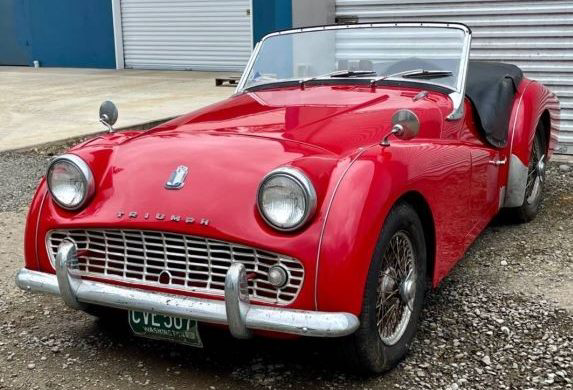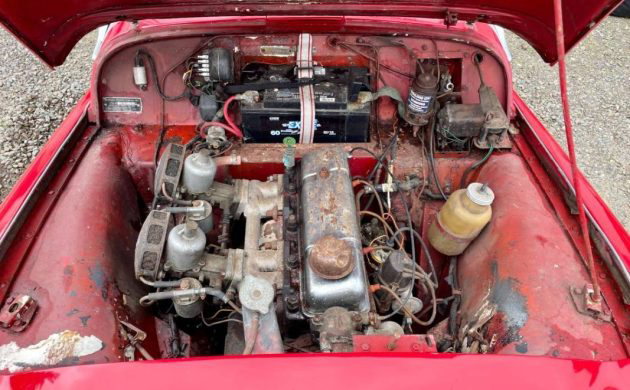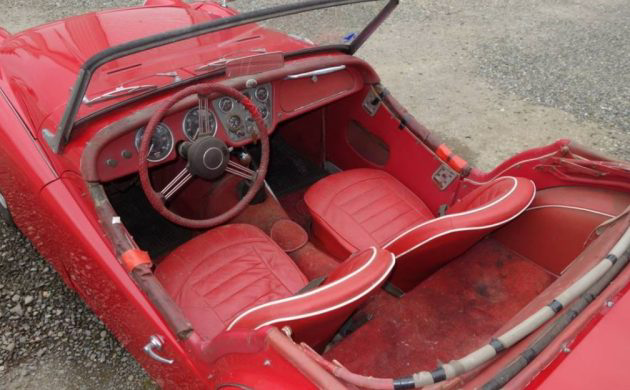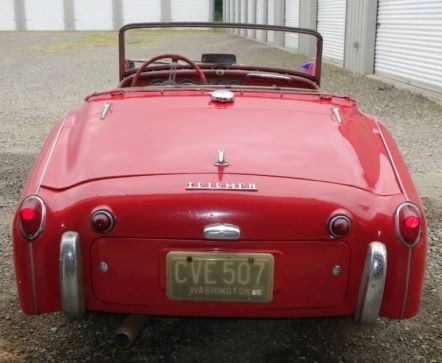It’s 1953 and Triumph has brought a new car to Jabbeke, Belgium, to race it down a nearly flat, nearly straight stretch of road between Brussels and Ostend. This unique bit of carriageway was a perfect test “track” for speed trials. Before Triumph showed up with its TR2, Goldie Gardner raced MG EX135 to just over 159 mph. Donald Healey joined the fun with his Elliot coupe, running to 110 mph. Soapy Sutton brought a Jaguar XK120, attaining almost 133 mph. The TR2 was no slouch, making 125 mph while powered by a mere 1991 cc four-cylinder. A new generation of Triumph cars was on the way. The TR2 evolved into the more sophisticated TR3, thrilling drivers with 100 hp and front disc brakes by the time 1960 rolled around. T.J. found this long-stored TR3A for us, waiting for its next owner in Chimicum, Washington.
The TR3 was launched in 1955 looking not unlike its predecessor. Early versions are called “small mouth TR3s”, describing a narrow grille opening. An update in 1957 brought a full-width grille, outside door handles, larger bumpers, and other niceties. These cars are called TR3As – though not by the factory – to differentiate early cars from later cars. The last of the breed was the TR3B, made only for model year 1962. The factory incrementally improved output using larger carburetors and re-engineered cylinder heads; not until 1962 was displacement increased. The gearbox is a four-speed manual with no synchro on first; overdrive was optional. This car’s 1991 cc four-cylinder has not run for at least ten years. Unfortunately, the sellers know nothing of the car’s history, except that the deceased owner had the car for 45 years.
The cockpit trim needs help; the carpets have seen better days. But all the gauges and switches are present, as well as the grab bar, side curtain hardware, steering wheel, and top bows. The side curtains are with the car but in poor condition; the convertible top is likely too shrunken to be useful. This view emphasizes the cut-down doors, following the sweeping fender line as it descends the car’s waistline.
Though the paint appears shiny, the seller notes flaws including drips and blistering. The trunk lid sits high on the driver’s side. A glance at the VIN plate reveals a crust of rust invading the firewall. The catalog of defects is slightly mitigated by its $9000 price tag; the car is advertised here on craigslist. Like many collector cars, TR3 values have drifted down since about 2015, when prices exceeding $40k were common. Today, a nice example can be had for around $25k. Even a restrained restoration will absorb time and money here, but these cars are simple and rewarding. What do you think – snap it up, or pass it by?









Hmm, let’s see, this, or the Ferrari coming up next. $9 grand vs. $189 grand,,,for me, the TR3, net savings, $180 grand,,,I could theoretically pixx away someplace else,,,as if. I’m a TR4 fan, but I certainly wouldn’t kick this out of my parking stall. Wait, can’t have any leakers, so out on the street it goes. I think red is a bit loud for a British car, more of a flashy Italian thing than a subdued Englishman would have. Still, they’ll see you coming and having a bit of remorse. Before the Jeep, I looked at a Spitfire, for $2800( I bet $2 would have got it) that the seller was clearly tired of, and I expect the same here. Nice big trunk to carry all your tools and spare parts, don’t think so? Motor on, my friends.
Mine didn’t need a big boot for spares and tools as it never broke down during the two years and several thousand miles that I drove it both on tarmac and some very bad gravel roads.
In 1965(?) my Father found one in Oak Park that only had 20k miles and included the electric OD. My cousin Robert, who had recently escaped Idi Amin and his homicide squads looking for British passports, got away by going cross country on a Yamaha and was looking to replace the TR4 he was forced to leave behind. As you can imagine, Robert became a mythic creature to us youngsters as he had been all around the world building homes and businesses. Dad drove the car from Chicago, and me and my Grandmother stuffed ourselves in with our luggage mounted on the trunk rack and parts and tools in the “boot” to deliver the car to Palo Alto (from CdA). One of the highlights of my pre-adolescent life. Dad had owned Twin-H Hudsons, so he was conversant with synchronizing carbs and the car ran the 1000 miles without a peep and got 25 mpg. I recall Dad could lay his hand flat on the ground while sitting in the driver’s seat. Seeing this has done what Barn Finds does so effortlessly = bring a warm feeling of nostalgia while showing a car of my past. Thanks for an excellent Friday opener.
Bits of rust, crash evidence up front over grill, interior in bad shape, etc.. Need a good look at the underside before jumping on this one.
That first paragraph was a nice read MR…..and it’s gone…..sold !
Thank you! …. I am not surprised it sold. I thought the ask was reasonable and if you consider that the sellers just wanted to be rid of it, there was likely room to bargain.
Much before 1960, my 1957 small mouth TR-3 came with front disc brakes. Front disc brakes on the TR-3 were introduced in 1956 or about 10 years before they were available on a chevy.
In 1902 Lanchester Car Co. of the UK introduced disc brakes on production motor cars, long before Jaguar, Austin Healey, and Triumph, ALL British cars incidentally, had them as standard. The first American car to have disc brakes was the 1969 Cadillac.
“The first American car to have disc brakes was the 1969 Cadillac.” No. My 1968 Torino GT had them, as did my 1968 Mustang GT.
In 1959 ALL Cadillacs had disc brakes, whereas, I’m not sure that all Fords had them.